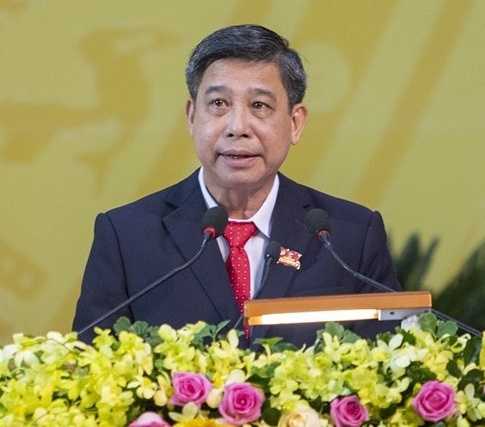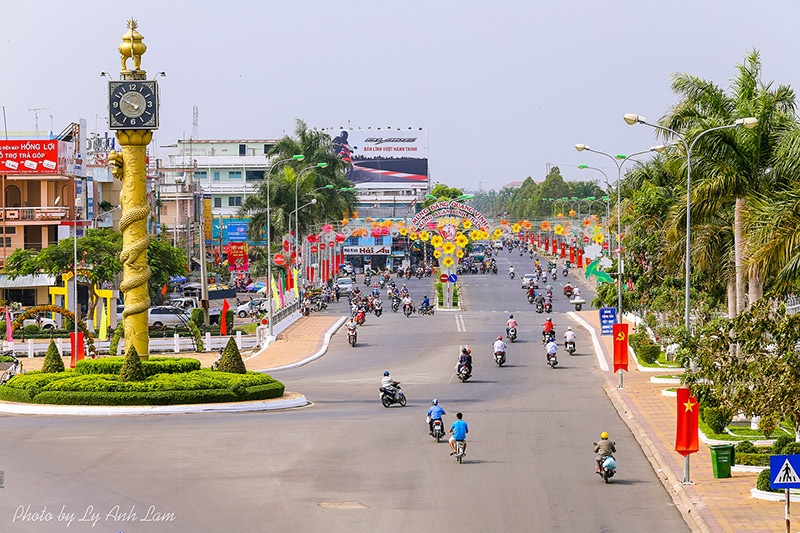INTERNATIONAL INVESTMENT
AND PORTAL
 Dong Van Thanh, Chairman of Hau Giang People’s Committee
Dong Van Thanh, Chairman of Hau Giang People’s Committee
The government has enacted a wide range of orientations and policies on Mekong Delta development. What factors constitute Hau Giang’s distinct advantages?
The Mekong Delta has grabbed a great deal of attention from the government. On April 2, the Politburo enacted Resolution No.13-NQ/TW presenting orientations for the region’s socioeconomic development, ensuring defense and security to 2030 and with a vision towards 2045.
On the global scale, there is a growing trend of production chains from different countries moving into Vietnam. Domestically, many production chains are moving from southern development hubs into localities in the region.
Leveraging growing investment attention and the landing of many production chains from both global and local players, the Mekong Delta, including Hau Giang, enjoys enormous opportunities and conditions to take off.
Situated in the heart of the delta, Hau Giang helps bridge localities in the south Song Hau region, including Kien Giang, Ca Mau, Bac Lieu, and Soc Trang, with the rest of the delta and other regions in the country.
Not only accommodating the passage of inter-regional highways, Hau Giang is also the convergence point of three prospective expressways: Can Tho-Ca Mau, Chau Doc - Can Tho - Soc Trang, and Ha Tien - Rach Gia - Bac Lieu.
These highways, once completed, help connect Hau Giang with Can Tho International Airport, Tran De Deepwater Port - whose planning was approved by the prime minister - and other localities in the region, from there creating multiple opportunities to push up local economic development, particularly in the field of industry, urban, and trade services.
Comfort in transport connection by road, waterway, and air has constituted Hau Giang’s advantages for multi-model transport development, saving on the logistics cost and optimising supply resources, from there rising into a major regional logistics centre.
Moving forward, many districts and towns in the province garner optimum development indexes in terms of access to market, production areas, and logistics centres, making them ideal venues to open manufacturing plants in agriculture and food processing, or acting as distribution centres serving the whole region.
These factors have contributed to turning Hau Giang into a key location, and it is now the right time for investors to forge ahead with business ventures in the region generally, and the province particularly.
 Photo Ly Anh Lam
Photo Ly Anh Lam
What fields are prioritised for funding and development in light of the province’s investment attraction strategy?
Since November last year, industry, agriculture, urban, and tourism are set as four strategic breakthroughs to beef up the province’s socioeconomic development, replenish the local budget, and enhance people’s lives. The province, therefore, pays particular attention to investment attraction into these four pillars.
The tasks involve developing a modern industry, attracting cutting-edge and eco-friendly technologies, creating jobs, raising budget sources, and developing the processing industry attached to local material sources; restructuring agriculture for sustainable development, aligned to local natural conditions; developing green and smart urban systems; and developing quality tourism on a selective basis, choosing products in which the province has the advantages for investment development.
In that spirit, Hau Giang aims to lure investment into high-tech fields and projects with huge contributions to the local budget. Priority will also be given to projects and businesses having spillover effects, using local input materials and servicers, attracting local labourers with stable jobs; as well as those using less land and causing the least impact on the environment.
The lack of cleared land is one of the major barriers to investment attraction in the region. How has the province been dealing with this impediment?
After the province’s establishment in 2004, Hau Giang has engaged in deploying the construction planning of local industrial zones (IZs) and industrial clusters (ICs) in favourable locations having ample potential for socioeconomic development.
Currently two IZs, Song Hau and Tan Phu Thanh, have reached an 80 per cent occupancy rate. During this decade, the province envisages working on the planning schemes of eight IZs covering over 1,700ha in total and also setting up five new ICs. Three investors have registered to invest in IZ infrastructure development over 600ha, and these projects are set for implementation before 2025. The land fund is huge to serve abundant investor needs.
During recent meetings with investors and businesses, the province’s top leaders have conveyed the message of cultivating a pro-business environment through concrete actions. How has the message been realised thus far?
To best serve investors and businesses, Hau Giang has set forth an action slogan with two “quick” factors and three “good” factors: quick in site clearance and doing investment procedures, while offering good opportunities, good policies, and good infrastructure.
To shorten the time for procedural settlement, in February, Hau Giang People’s Committee enacted Decision No.326/QD-UBND on establishing the Steering Committee for Investment Promotion. The Secretary of Hau Giang Party Committee will be acting as head of the committee, and top leaders of diverse local management agencies will act as committee members.
This committee is deemed a turning point, helping to significantly shorten the time for investment procedure settlement by less than 50 per cent compared to regulations to benefit investors and businesses.
Hau Giang is also efficiently deploying e-government and digital transformation models across the fields and sectors with increased IT applications to ensure quick settlement of administrative procedures, serving people and businesses in a better way. In addition, the province has established a steering committee for site clearance with top leaders. The committee’s top target is swiftly dealing with obstacles in the site clearance process to push up project implementation.
Hau Giang is lagging behind, which has forced us to scale up efforts to reach a full upswing in development. During 2021-2025, our top targets are upscaling the local economy and striving to grow faster than the country’s average. For the remainder of the decade, Hau Giang aims to reach regional GDP growth of 8-10 per cent and contribute more than $565 million to state coffers.



















